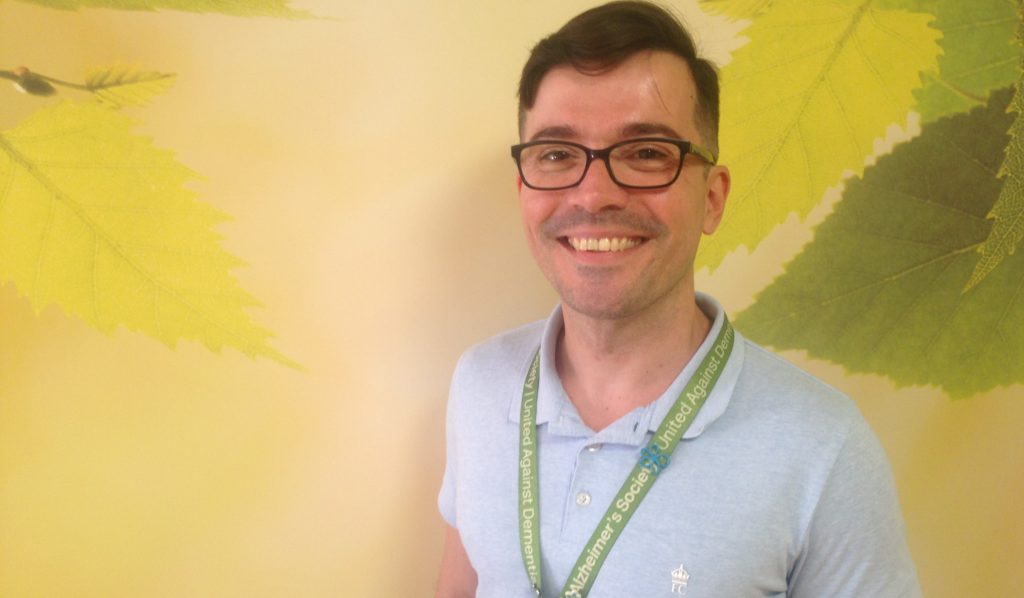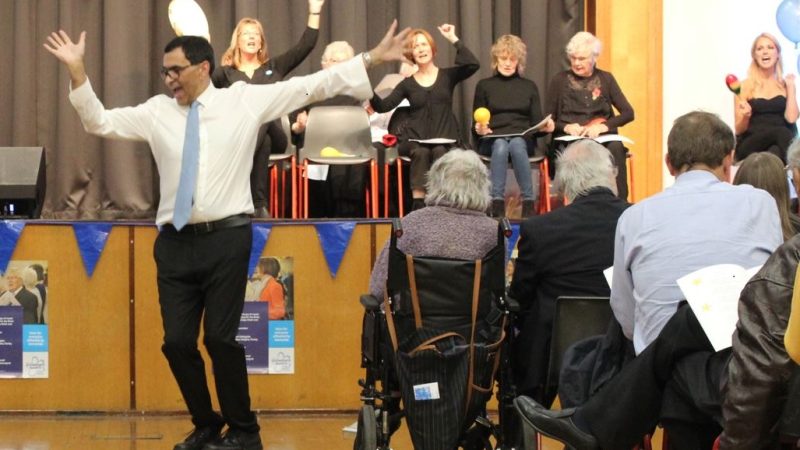When singer Peter Edwards belts out his rendition of Sweet Caroline at Merton Dementia Hub, he can be sure his audience will sing along. A great voice like Peter’s will always put a smile on people’s faces. But the effect on his audience is remarkable. Almost magically, Peter’s singing brings instant engagement from people who beforehand appeared withdrawn and lost in their thoughts.
There is a definite uplift in people’s mood when they hear familiar songs”
Peter Edwards
This room full of cheer is part of the Singing for the Brain project run by the Alzheimer’s Society. Since its launch in 2003, the project has spread across the UK, bringing happiness to people who have a dementia diagnosis, and those who care for them.
“There is a definite uplift in people’s mood when they hear familiar songs,” says Peter, who leads weekly sessions at the Hub. “Singing improves brain activity, wellbeing and mood. Everyone who comes along to a session says that it has improved their life in some way.”
In recent years, there has been a growing understanding of how people with dementia benefit from associative memory techniques, such as the reminiscence rooms with period décor that inspire conversation and relaxation. Singing familiar songs has been found to bring almost instant engagement.
Music and lyrics are deeply embedded in people’s memories
Peter Edwards
“Music and lyrics are deeply embedded in people’s memories,” Peter explains. “It is to do with the location in the brain where pleasurable memories are stored, the familiar structure of the music and the way it creates deep emotional links. When you have a familiar melody, it is more likely to stick. One of the exciting things we’ve discovered is that even people with advanced dementia are sometimes able to learn new songs.”
Familiarity is an essential part of Singing for the Brain with songs from Broadway musicals certain to spark engagement. The Beatles and Abba are also popular, along with traditional folk songs and old-time music hall numbers such as The Lambeth Walk.
Says Peter, “We choose songs that are accessible and hope that people will also sing them when they’re back at home.
“Each session is a musical journey with a clear start and finish. We use a variety of tempos and styles and at the end, we have a goodbye song. We’ll Meet Again is always popular!”
Merton Dementia Hub has been hosting Singing for the Brain for seven years. Numbers fell following the pandemic, but are now picking up again, according to Community Dementia Adviser Daniel Steiner, who works on the sessions with Peter.
It is so empowering for people and wonderful for their families and carers too – it lights everyone up
Daniel Steiner
A former professional musician, Daniel first noticed the associative power of music when he was teaching piano in his native Brazil. “I was working with a woman with advanced dementia. She had lost all her powers of verbal communication, but I found that she could still sing a whole lyric from beginning to end perfectly.”

“It is so much easier to communicate with someone when you discover their passion. It could be art, music or dance, or singing. It is so empowering for people and wonderful for their families and carers too – it lights everyone up.
“We have one enthusiastic participant in the sessions, who travels across South West London by two buses to make sure she can take part. ‘It’s like a family here’, she says.”
The benefits of Singing for the Brain are summed up in an encounter Peter Edwards had recently: “A man came up and shook my hand. He said: ‘Thank you. You gave me my wife back for an hour.’”
Alzheimer’s Society Services Manager Bill Gibbons said: “We are able to provide Singing for the Brain at our Hub, thanks to funding provided by London Borough of Merton. These weekly sessions form a vibrant part of our community dementia support service across the borough”.
